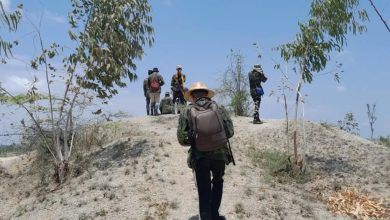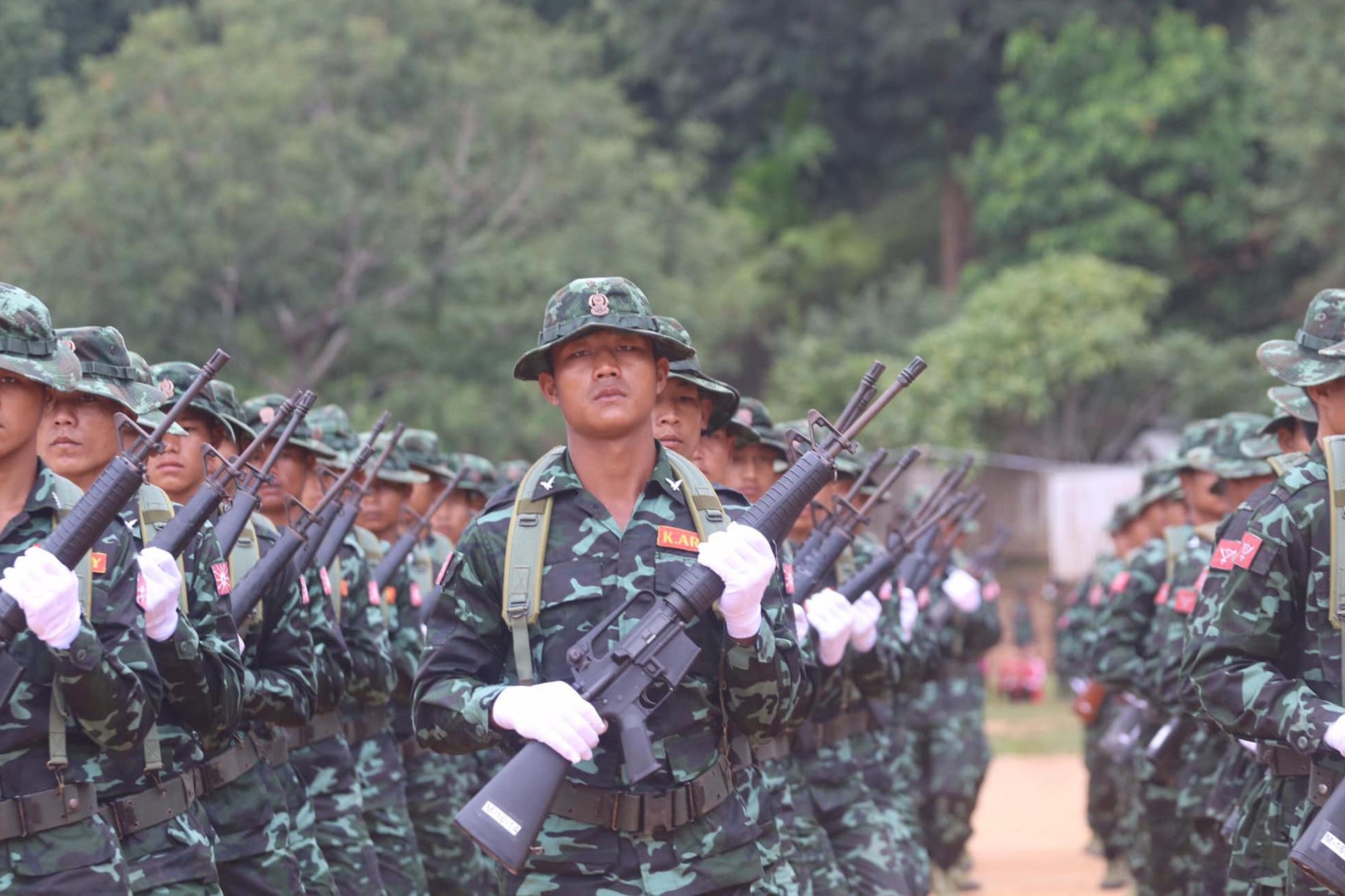
The junta’s crackdown on political opposition and civil society has not spared Myanmar’s workforce, with unions banned and criminal charges levied against multiple leaders and members.
Workers from Yangon’s factories were among the first members of the public to protest the February 2021 coup. Many are now among the 1.6 million employees who have since lost their jobs nationwide since the military’s attempted seizure of power, according to the International Labour Organisation (ILO).
Some 16 labour groups have been outlawed by the coup council, including the Coordination Committee of Trade Unions (CCTU). Myanmar Now spoke with the CCTU’s secretary general, Ye Naing Win, about how the organisation has remained active, and the ways in which workers have been affected by junta repression.

Myanmar Now: How has CCTU been operating since the coup?
Ye Naing Win: As a group, we have stood on our own two feet since the beginning. Funds have grown tighter, but it doesn’t mean we can’t operate, even though there are many challenges. We don’t have a physical office anymore. We used to be able to openly help workers whenever there was a complaint, but now we can only provide them suggestions on what to do and where to go.
How are factory workers in particular getting by?
Political instability and international sanctions have led to many people losing their jobs, as the factories have been shut down. Workers who were once permanent salaried employees have either been fired or they have been hired as daily wage labourers.
Fewer complaints have been filed to our offices. There used to be many, including regarding matters of salary, but they have all stopped now. Protests have almost completely stopped, too. Jobs are scarce and there are fewer opportunities. Workers are no longer safe.

Has there been any progress made on earlier plans regarding the formation of unions to advocate for workers’ rights?
It was not very easy to form workers’ unions in factories even before [the coup]. The previous [elected civilian] government was only allowing them to practise that right because the right to association is included in ILO conventions to which Myanmar is a signatory. The opportunity to practise that right has become almost obsolete since the coup. Some employers have been turning a blind eye to workers’ rights—not that they didn’t do this before, but it has become worse. The complaint mechanisms were good before, at least. They still exist today, but very few people want to actively help workers left in the country. The majority of labour organisations that supported these workers have left.
Workers have begun to lose their legal rights. They can no longer demand recognition of their rights as they have to prioritise keeping their jobs, increasing their salaries, and improving their work environment. That’s why plans to form workers’ unions have been halted.
Is it safe for labour organisations to stay in the country?
There are problems either way, whether they stay or go. There have been some disagreements between us and some exiled labour organisations. This is not the first time we’ve faced a military dictatorship. I’ve been working on labour issues since 2005. We have gone through this before, and we managed to continue working. When we finally got a civilian government, things became easier and we could work openly and more widely. Now that we are back under the old system, we just have to work in the way we did before.
Some exiled labour organisations have criticised or condemned labour groups for the way we work. The military council is also keeping a close eye on us to see how far we will go, how united we become, or to what extent we will challenge them. But our job is stimple: we are just going to stay connected to the workers.
How do you work with the junta’s labour ministry?
We have only been working with the ministry’s workers’ affairs departments. Our organisation was just helping with a case about a complaint being filed to the arbitration council regarding the firing of workers. Resolving labour disputes through this council used to be convenient, as the complaints were written by workers’ affairs organisations and labour unions. However, complaints being filed now have been written by the workers themselves, so there is a lot of missing information. This in turn results in losses, even though what is being reported is correct. I always help out if I find out that someone is right and if what they are asking for is something they deserve.
Laws to protect workers’ rights have been around since colonial times—they aren’t yet obsolete. We need to be able to practise the rights that are outlined, but we inevitably need to be able to report issues to the relevant departments. People ask me if our organisation is working with the junta. What I say is that there isn’t any place to file labour complaints other than the departments currently in existence. All we can do is tell them what is within our rights and demand to practise these rights to the full extent. If they refuse to comply, it’s them who are breaking the law. That’s my philosophy.

What types of cases have you been asked to help with recently?
There was a case where the workers did not get the full salary that they were owed when a factory in East Dagon shut down. They were not paid for six months. At first, the workers called us and told us that they were going to hold a protest in the factory. I told them not to protest as it could result in further misunderstandings rather than them getting what they actually wanted. I arranged a direct negotiation with their employer and more than 800 workers got the salaries that they were due. It was a success.
The problems that the majority of the workers are facing are related to getting fired from their jobs, not getting compensation, or losing salaried jobs in order to be hired on daily wages. Some daily wage labourers have been fired when they expected to be promoted to salaried jobs. These are violations of workers’ rights by the employers .
Some foreign employers want to exploit the workers amid the current political instability. Re-hiring a permanent worker as a wage worker saves them six days’ wages per month. When they do that to hundreds of workers, they make a lot more profit. The workers, on the other hand, are barely left with any money to buy food.
There used to be workers’ representatives at the factories on top of workers’ unions. Are they still there?
After the situation calmed down a bit following the coup, the Ministry of Labour reopened their problem-solving mechanisms. Coordination teams were formed again in every factory, called Work Coordination Committees or WCCs.
The current regime’s labour administration has said that they will not allow any complaint to be filed to the authorities without a consultation with the WCC. In some factories, there are no workers’ unions but there is a WCC. While it is said that they are formed with an equal employer to employee ratio, the WCCs are notorious for working in favour of the employer, even under the previous two governments. It’s not that easy to solve problems at the committee level.
Some workers’ unions were abolished when factories shut down, and they are not in a position to form again. Some factories still have unions, but they are not operational. In other words, there is little room for unions to take any action, resulting in more violations of workers’ rights. Some employers have threatened and exploited workers due to this weakness.
Would you say that workers are still able to demand their rights through protest?
This administration doesn’t allow any kind of strikes at all, let alone workers’ strikes. On top of that, workers’ strikes are different from other political protests. Student protests are based on their dedication: they remain united through any condition because they are committed to the cause. The fight of workers, however, is based on their basic need to survive. Depending on what their basic needs are, their fights can be very big. Another thing to take into consideration is that we need to achieve what we’re fighting for in every strike—every strike has to bear fruit.
That’s why we can’t easily make a decision to go up against an administration that doesn’t allow strikes. However, if we are too broke to even buy food, we will have to start demanding our rights. If tens of thousands of workers are starving, they will go out on the streets to protest, without anyone even rallying them.
This interview has been lightly edited for clarity.



